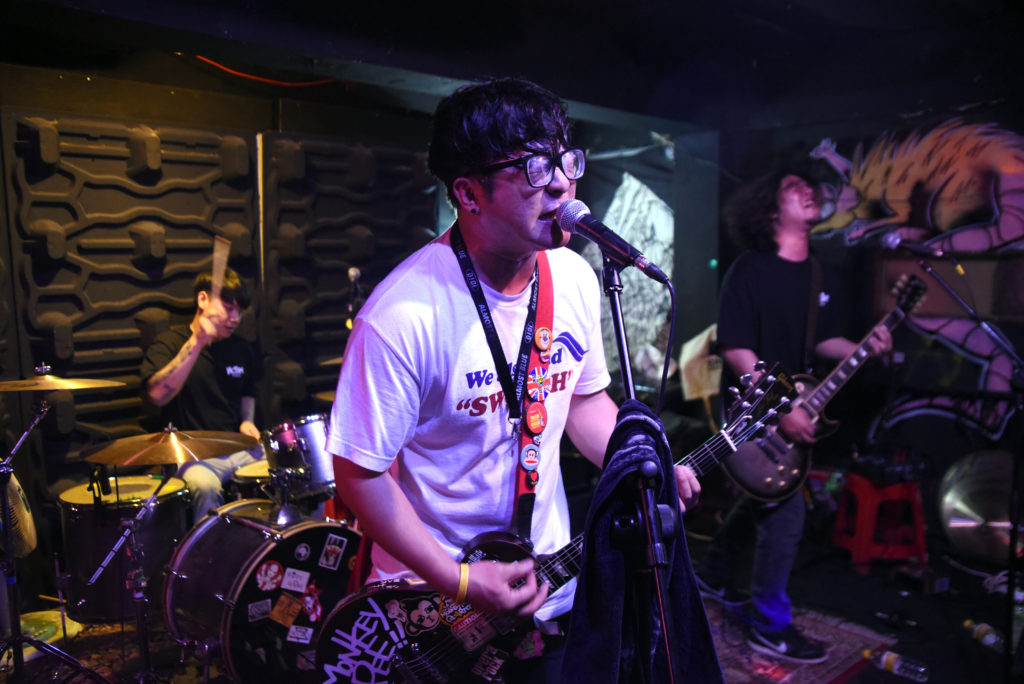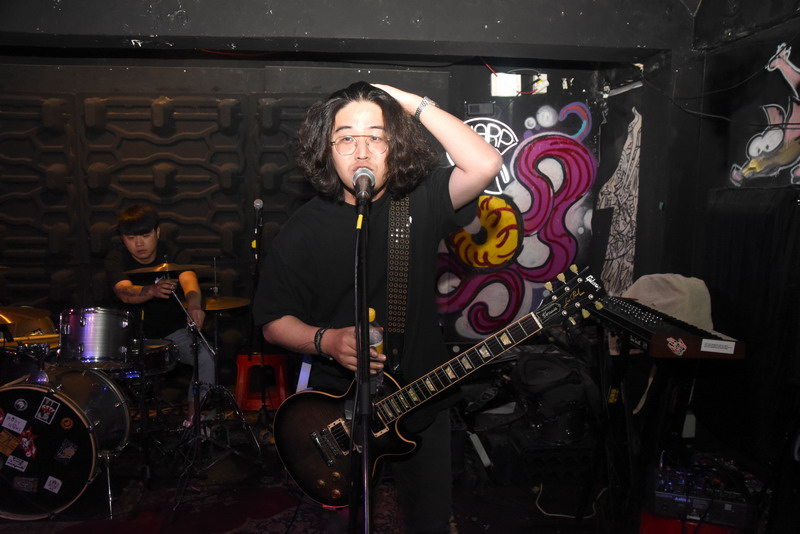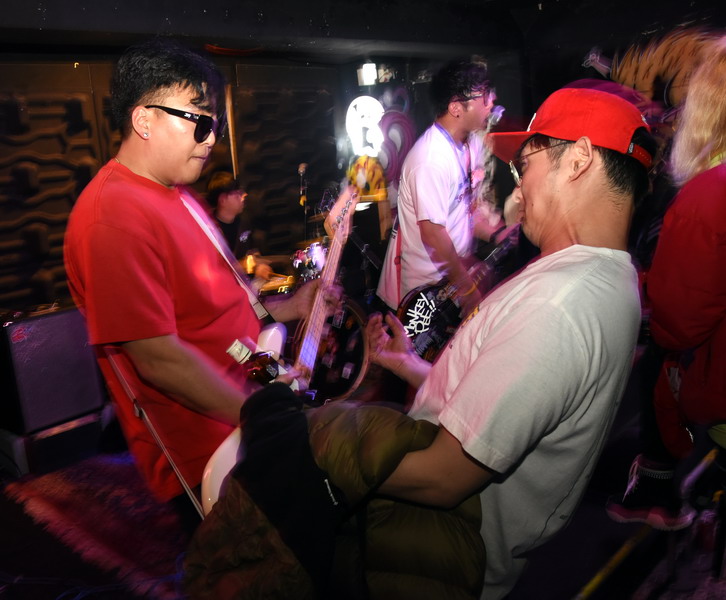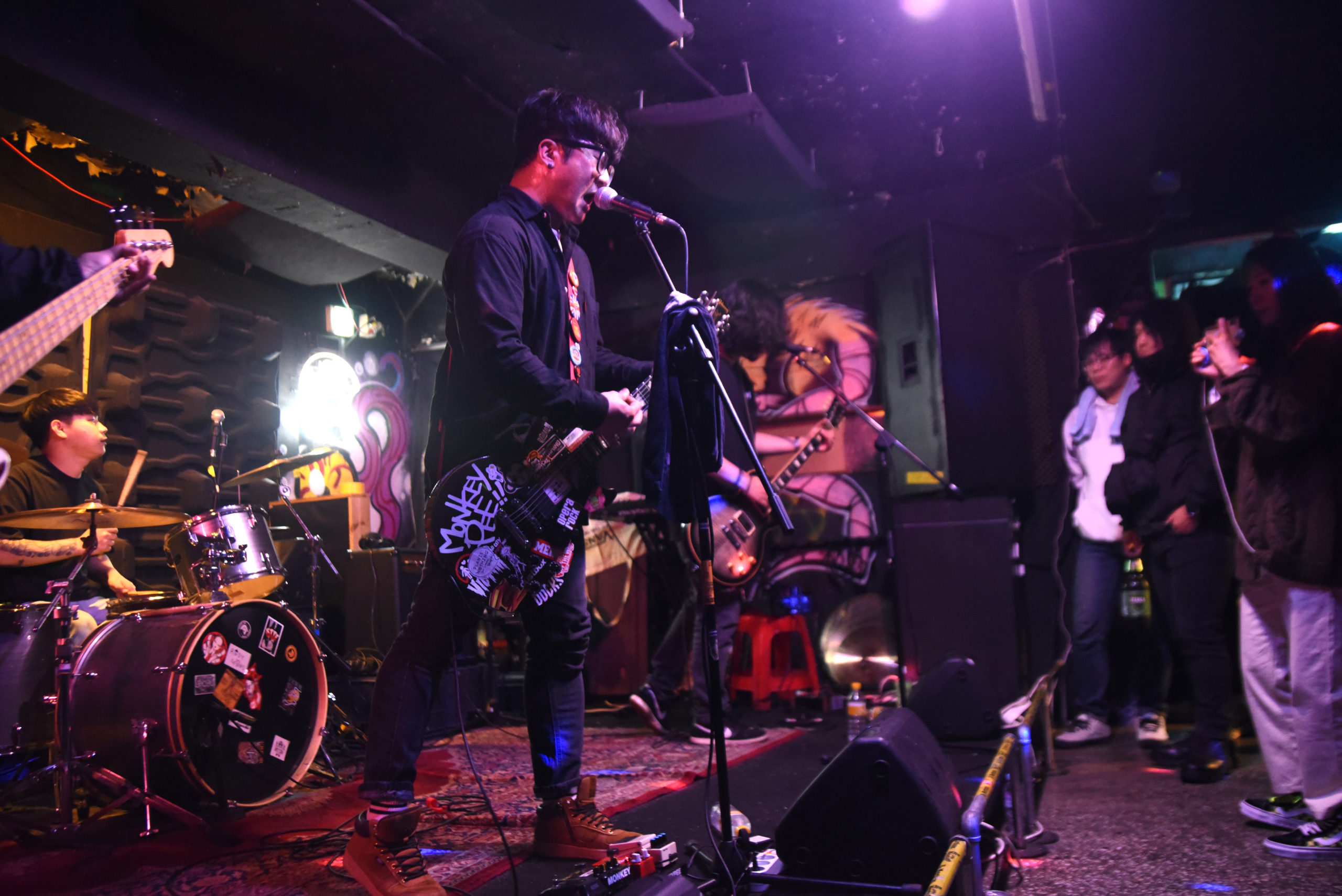Gwangju’s Punk Apes: Monkey Pee Quartet
Written and photographed by Jon Dunbar.
Punk, a musical genre of disobedience and nonconformity, is just what Korea needs in these times of political discord and societal misery.
Although punk dates back at least to the late 1970s, it didn’t arrive in Korea until the early 1990s, having been blocked from entering the country under the authoritarian rule of Chun Doo-hwan. Today, it exists in the shadows of the self-destructive K-pop industry, practiced by a small but dedicated community spread out across the country.
Gwangju, the cradle of Korean modern democracy, has its own punk scene. It’s not much, but it has produced a handful of great bands over the last couple decades.
“Gwangju is definitely a city with a spirit of resistance,” said Yang Gun-yang, guitarist and co-vocalist of Gwangju pop-punk band Monkey Pee Quartet. “We are the sons of the resistance.”

His words are both irreverent, poking a little fun at the idea, and matter-of-fact. The band members are too young to have even been alive during the 1980 Gwangju Democratic Uprising, but it’s a fact of life in their upbringing in this southwestern Korean city.
“I don’t know why, but I think there are many punk bands in Gwangju,” he said. “Gwangju is a small city. There aren’t many bands either. But I think that the percentage of bands in Gwangju playing punk is higher compared to bands playing other genres. It’s hard, but the scene is still moving.”
Yang rattles off a handful of names. There’s the “seomin” (서민, common people) punk band Dirty Rockhon. Yang’s own former drummer started the band Two Five. And he says there’s a new punk band, named Flight No. 8.
The scene here dates back to around 1999, according to a Gwangju News article by Adam Hogue published December 2012. That was when the club Gok’s opened, followed the next year by Backstage Club, and then Club Nevermind in 2003. One of the big names from those days is Bettyass, but that band is long gone now.
Punk, unlike K-pop, is built to endure, to not be forgotten the following week. Still, it’s been difficult to achieve permanence. Nevermind, according to Yang, closed and changed its name to Neverland around 2017, and he hasn’t been back since.
Yang says most of the shows he plays are at Bohemian, which opened in 2014 across the street from the Asia Culture Center, and Club Boojik, opened in 2010 near the back gate of Chonnam National University by a local youth pastor who wanted to provide a space for musicians to do their thing.
Yang’s band, Monkey Pee Quartet, celebrates its 10-year anniversary this year, a distinguished achievement for anyone, let alone a punk band in Gwangju.

He says the very oddball band name didn’t come from anything in particular, maybe just a desire to give people an uneasy first impression. “We didn’t want it to mean anything,” he said. “Originally, it was just ‘Monkey Pee,’ but I thought it was too short, so I added ‘Quartet’ to the end.”
The band has released about a dozen songs throughout the years, starting with 2013’s six-song mini-album Banana Stew.
“It was our first album, so I wanted to make it look like a appetizer,” Yang said. “‘Banana’ is also because of the band name.”
Their music is classic pop-punk, a melodic subgenre of punk that’s easily listenable and welcoming to new listeners. They write lyrics in either Korean or English.
The album contains their first song “Julie,” which Yang claims was originally titled “Jesus” in an earlier version on their demo CD. “But when I finished it, I changed the name to that of a girl that starts with J,” he said. “This was our first English song to try, and I couldn’t find time to put a message in it because I couldn’t complete it. Julie is actually nobody. I just wanted to feel the victim.”

Also in 2013, Yang started working on the song “My Old Virgin Sister,” a song the band didn’t end up releasing until 2018.
“Did you notice this song is about ex-President Park Geun-hye?” Yang asked. “It’s a song that I wanted to make to criticize her for her mistakes. I couldn’t finish the lyrics for so long because of the crazy incidents that kept happening while I was making it. Whenever I tried completing the lyrics, there’d be a new development – the Sewol sinking, influence-peddling scandal, impeachment.”
Lately, Monkey Pee Quartet has been releasing singles paired with music videos, which Yang calls the band’s “Singles Project.”
The latest was “Bad Ape,” released in September, featuring a music video of an ape wandering a post-apocalyptic landscape. Yang says the song is named after the character Bad Ape from 2017’s War for the Planet of the Apes.
“I tried to make the music video feel like ‘Planet of the Apes,’” he said.
They used real scenery to create a post-apocalyptic atmosphere, filming in an urban redevelopment zone in Gwangju he stumbled upon on his way to make the video, and at an abandoned school in Boseong County in South Jeolla Province.
“He lost his coworkers and family, and he was alone for a very long time, but he didn’t lose his sense of humor, he endured his grief, and then he met with Caesar,” Yang said about the song. “I sang about how he endured a time of loneliness, sadness, and anger. Unlike the movie, the ape in the music video meets a human companion. The message that I wanted to make is loneliness and reconciliation.”
Yang said the quartet’s next video should be out early this year, and it’ll mark the last release of the band’s Singles Project. After that, they have lots of plans for their 10th anniversary year. They want to return to making another full album, and Yang said he plans to continue making music videos. He also hopes to revive a plan to tour Japan this year after it fell through last year.
“I hope we can become a punk band representing Gwangju,” he said.
Visit facebook.com/monkeypq to learn more about Gwangju’s Monkey Pee Quartet and find out about upcoming concerts. Their music videos can be found easily on their YouTube channel.
“Bad Ape” https://youtu.be/8qGpVzud6bs
“My Old Virgin Sister” https://youtu.be/P33DJehOYWU
“Julie” https://youtu.be/UyktfmhnzkM
The Author
Jon Dunbar is a member of the Gwangju International Center living in Seoul. He is also a council member of the Royal Asiatic Society Korea Branch and a copy editor at The Korea Times.




